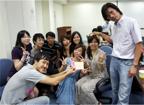Report on Short-term Visiting Program in Taiwan
Michie Matsuki: M1, Master's Program in Medical Sciences
Major: Gene Regulation
Accepting Laboratory: Dr. HY Chou Laboratory
Report on Short-term Visiting Program in Taiwan
I went to the National Taiwan University to study for two weeks. The Short-term Visiting Program in Taiwan was constructed of two sections. The first section being a CBT course, where all the participating Japanese and Taiwanese students stayed in a laboratory and conducted the same experiments for a week, with a Japanese and Taiwanese student pairing up as a partner. The second section was a lab rotation where each of us were appointed to a laboratory at NTU and given a theme. Under the guidance of Taiwanese TA students, we collected data and gave a simple presentation on the results at the end of the week.
The NTU is a traditional university with its vast campus located in the center of Taipei, the capital of Taiwan. The students of NTU were all sophisticated that from just a small talk, I could feel their intelligence and that they were cultured. When they talked of their professional field, they spoke in fluent English which is not their mother tongue and spoke out their opinions with vitality in the center of the room with thirty people from CBT course. In the discussions between friends, they talked in a calm manner (a friend being questioned was somewhat confused), and the students continued their discussions without the microphone when it lasted longer. I admired how they expressed their opinions on their field and was motivated to study harder in order to have deeper discussions on my own field. And I also learned from the Taiwanese students, their positive attitude on expressing their opinion thoroughly through the discussions.
In both the CBT course and the lab rotation, I had to cooperate closely with the Taiwanese students and it was essential for me to speak in English. In the beginning, I could hardly speak in English and when the discussions on the experiments started, I could not participate in them because the only thing I could do was to try to understand the content. And when the discussions heated up, both the speakers started speaking faster that it became difficult for me to catch what they were saying due to my poor listening. During that time, for the speakers and people who were listening and understanding the contents, they must have had something to learn from it. But for me, because I did not have enough English proficiency, I lost that chance. This experience of placing myself in a situation where the only way to communicate was in English have motivated me to think of the need to improve my English, a communication tool, to a practical level.
The stay in Taiwan had been as short as two weeks but I felt that my English improved more or less. After returning back to Japan, I read some articles in English and I was able to understand them better than before. Experiencing two weeks of using English through day and night, made it possible for me to communicate in English in the end. I felt that my English proficiency in reading, writing, listening and speaking had improved through the participation in the program. For a researcher to gain the latest information on one's field, it is essential to have an English proficiency to read scientific paper. At the same time, to be able to communicate with foreign researchers in English, the internationally common language, and to have discussions with many researchers will be a great advantage in carrying on my researches. And to learn the practical English through the research will be beneficial for the discussions in English on the field of life science.
Before participating in this program, I thought that because of the internet and the time distance to foreign countries getting shorter today, that it is possible to obtain the latest technology within Japan and that there were no need for studying abroad. But after completing the program, even though it may be the case, I strongly feel that it is essential and meaningful to study abroad for someone who wants to become a researcher.
(From report)
 Musha-shugyo Photos
Musha-shugyo Photos
* Click on thumbnails.








